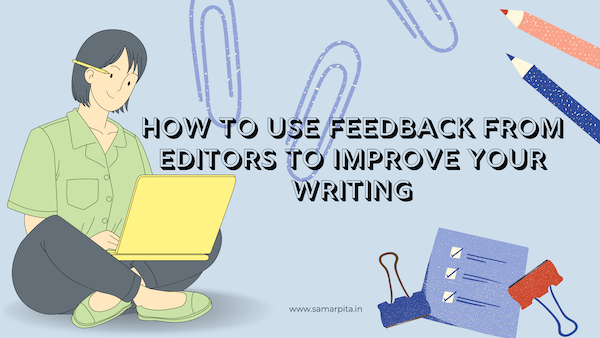Receiving feedback from editors is a crucial step in the writing process. It’s an opportunity to refine your work, enhance your skills, and ultimately create a more polished piece. In this blog post, we’ll delve into the art of utilizing feedback effectively, exploring key strategies to harness constructive criticism for the betterment of your writing.
Also Read: Content Marketing on a Budget: Maximizing Impact with Limited Resources
Approach Feedback with an Open Mind
When you receive feedback from an editor, approach it with an open and receptive mindset. Keep in mind that the goal is to improve your work, not to criticize your abilities. Be willing to consider different perspectives and viewpoints.
Identify Patterns and Trends:
As you review the feedback, look for patterns and trends. Are there recurring comments or suggestions? Identifying these common themes can help you pinpoint specific areas of your writing that may need attention and improvement.
Prioritize and Focus on Key Issues:
Not all feedback is created equal. Prioritize the feedback based on its significance to the overall quality of your writing. Focus on addressing the key issues that will have the most substantial impact on improving your piece.
Also Read: Content Marketing Metrics That Drive Small Business Success
Understand the “Why” Behind the Feedback:
Dig deeper into the feedback to understand the underlying reasons behind the suggestions. Editors may not explicitly state the reasoning behind their comments, so take the initiative to uncover the “why.” Understanding the rationale will empower you to apply the feedback more effectively.
Revise and Experiment:
Once you’ve identified the areas for improvement, start revising your work. Don’t be afraid to experiment with different approaches. Use the feedback as a springboard for creativity, exploring new ways to convey your message and refine your writing style.
Also Read: Punctuation Magic: Making Your Writing Clear and Stylish
Seek Clarification When Needed:
If certain feedback seems unclear or ambiguous, don’t hesitate to seek clarification from your editor. A clear understanding of the feedback ensures that your revisions align with the intended improvements, creating a more collaborative and productive editing process.
Preserve Your Unique Voice:
While implementing feedback, be mindful of preserving your unique voice as a writer. Striking a balance between incorporating suggestions and maintaining your individual style ensures that the final piece remains authentically yours.
Also Read: Ten Crucial Editing Skills Every Writer Needs
Take Breaks During the Revision Process:
The revision process can be intense. Take breaks to step away from your work and return with fresh eyes. This will help you assess the effectiveness of your revisions objectively and make additional improvements as needed.
Use Feedback as a Learning Opportunity:
View feedback as a valuable learning opportunity. Each piece of feedback provides insights into your strengths and areas for growth. Embrace the learning process, and consider feedback not only as a means to improve a specific piece but also as a tool for developing your overall writing skills.
Share Revised Versions for Further Input:
After implementing revisions, consider sharing your revised work with the editor for additional input. This collaborative approach allows for a continued dialogue and ensures that the changes align with the editor’s expectations.
Also Read: The Art of Crafting Compelling Website Copy That Converts
Reflect on the Editing Process:
Take time to reflect on the entire editing process. Consider how the feedback has influenced your writing and what lessons you can carry forward to future projects. Reflection enhances your self-awareness as a writer and contributes to ongoing growth.
In conclusion, feedback from editors is a valuable asset in the journey of refining your writing skills. By approaching feedback with an open mind, prioritizing key issues, and using it as a learning opportunity, you can transform constructive criticism into a powerful tool for improvement. Embrace the editing process as a collaborative endeavor that propels your writing to new heights.
***
If you are looking for an excellent manuscript editor, someone to create content for your business, or an expert to help build your personal or professional brand on social media, then look no further and connect with me at editor@samarpita.in I can be followed on instagram at @samarpita and on twitter at @samarpitadotin.
***********
Read my ebook WRITE. EDIT. PROMOTE. to learn the basics about becoming an author – from writing your own book, to editing your first draft, and to promoting your book yourself! You can also read my ebook How To Write A Story Effectively and learn some valuable lessons about how a story can go from average to extraordinary. This book is part 1 of the series.
In fiction, I have two short stories for children in an ebook called Bedtime Stories.


